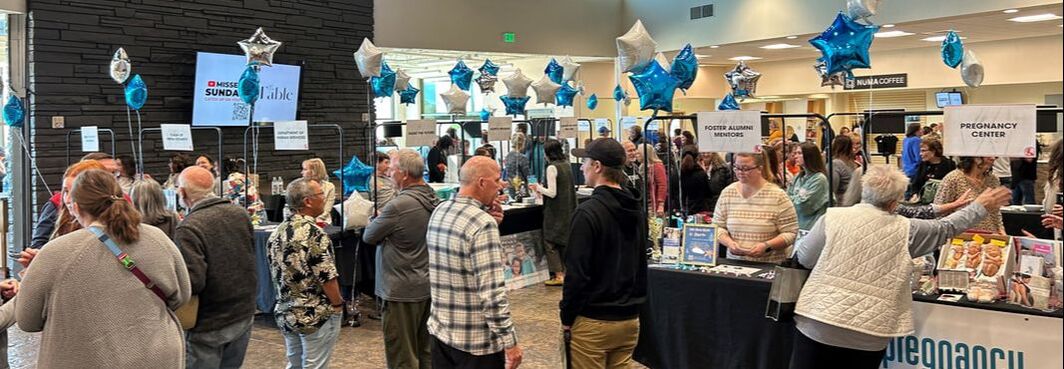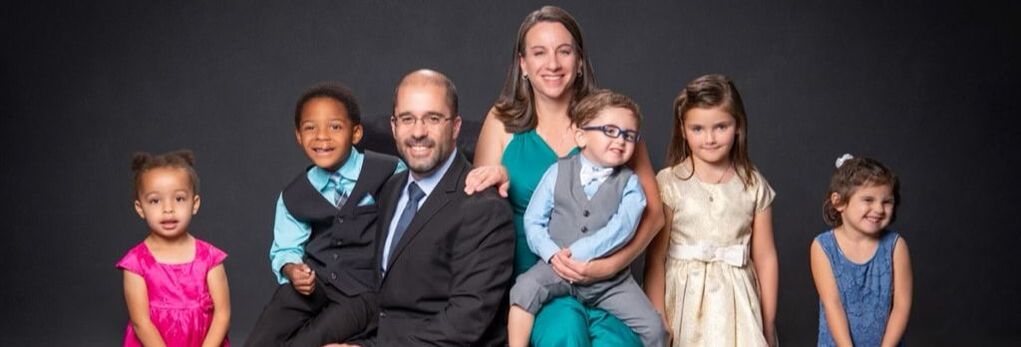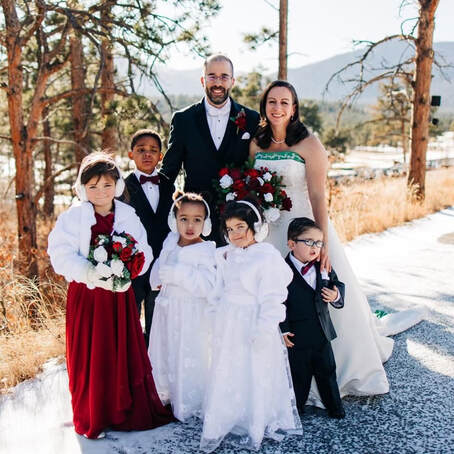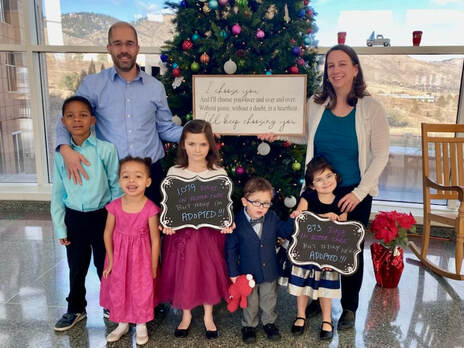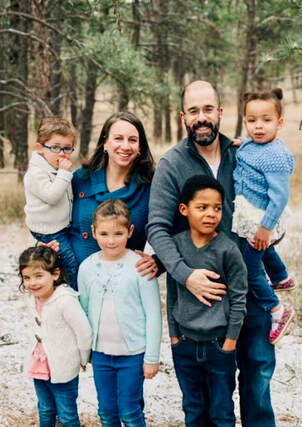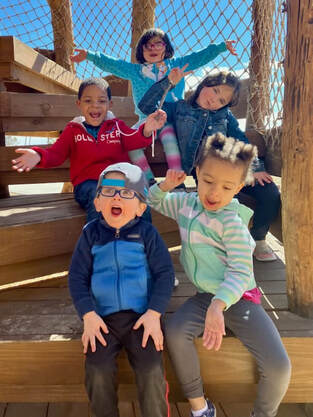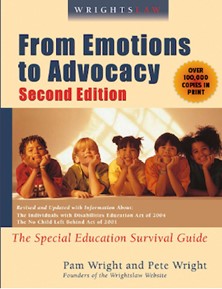|
It’s a New Year and time for, you guessed it, Resolutions! Or. Maybe not. I know before becoming a parent, resolutions were much easier to make and keep past Valentine’s Day. Children challenge our desire to have order, peace, and CONTROL.
So, what can we do when we want to make improvements in ourselves, our homes, and our families, but also don’t want to be disappointed when things go off the rails? I spent some time researching this and thinking about how I can set my family and me up for success with any goals, not resolutions, we have for 2024. Many of you have probably seen the acronym SMART for goals, but if you are new to the idea, here is the explanation. Goals Should Be: Specific Measurable Achievable Realistic Timely Here is an example of how to change a vague goal into a SMART goal. A vague goal may be, I want to read my Bible more this year. This goal is not Specific or Measurable. It is probably Achievable and Realistic, but there isn’t a way to evaluate if you have met your goal. To turn it into a SMART goal it would look something like this: My goal is to read through the Bible this year. This goal meets all the requirements of a SMART goal, but how do we achieve it? By making a PLAN! To meet my New Year’s Goal: I will get up 20 minutes earlier each day to add time to read my Bible. I will follow a plan so that I am reading the Bible in an achievable way. I will write down each time I complete a book of the Bible. I will not quit when I miss a day or two, or even a week, but will get back to my PLAN. I will celebrate when my goal is met! Goals are good. Change is good. Our kids need to see us setting goals and working toward them. They need to see that we never stop growing and learning. They need to see us succeed and they need to see us fail – they will learn from how we handle each of those situations. Maybe your family can set individual and family goals and help each other succeed, spend time cheering for each other. We pray that this year is a year of growth for your children, your family and you! That you will all grow closer as a family and closer to Jesus! If you would like to know more about goal setting, check out the Podcast “Our Time to Rise” Episode 436, A New Way of Effective Goal Setting. By Kym Schnittker, Arapahoe County FamiliesCare Manager
0 Comments
Christmas is our collective annual reminder that God chose to come as a baby to reconcile himself to us. The weary world truly rejoices at this good news. The heartache and hurt we carry throughout the year weigh us down, and we need to remember that God came near as a baby and will come again. This is the good news of Christmas!
At Project 1.27, we feel especially close to the Christmas story because we care for vulnerable kids and families. Not only is God’s heartbeat to care for the orphan (James 1:27), but Jesus’s actual heartbeat is in his baby-sized chest. Our savior chose to arrive on earth as an infant to a family in precarious circumstances. These details make that first Christmas a tender tale. One that’s not just about humanity’s directional pivot but also about a family needing care. All year, local congregations around Colorado demonstrate the spirit of James 1:27 by promoting the care of vulnerable kids in their communities. They do this through promoting foster care and adoption from the pulpit on a Sunday morning, hosting Project 1.27 family events or trainings, signing up to provide meals for foster families through our Neighbor Program, or developing a FamiliesCare ministry with trained members of their congregations wrapping around families at risk of having children removed through practical and relational supports. Jesus could have arrived on earth forcefully and powerfully. Instead, he chose the humble skin of a child who needed a place to rest his head. This season, let’s remember that God calls us as his followers to care for our communities' vulnerable children all year. At Project 1.27, we’d like to help your church do just that. “Fear not, for behold, I bring you good news of great joy that will be for all the people. For unto you is born this day in the city of David a Savior, who is Christ the Lord. And this will be a sign for you: you will find a baby wrapped in swaddling cloths and lying in a manger.” -Luke 2:10-1 By Alex Kuykendall, Director of New Development and the National Network It’s that time of year. Presents are under the tree, lights are hung around town, and there are 100 fun activities in the area. Your family is planning a cookie decorating party with Christmas music, hot chocolate, and maybe watching The Grinch Who Stole Christmas. One of your friends just began fostering and has two kids in her home. You immediately extend an invitation, and she accepts. The festivities have begun, and most kids are having a great time. You notice, though, that the two kids who are in your friend's care don’t seem happy about anything- in fact, the more fun that is happening (music, dancing, decorating…), the more amped up they are getting- they’re starting fights, snapping at each other and even throwing cookies. When the party's over, you find yourself wondering what went wrong.
3 Things to consider before inviting foster families into your home:
The truth is that the Holiday season can be very chaotic for kids who have experienced loss and trauma. Sometimes, just a few steps or a lens of empathy and understanding can be a game-changing experience for your friends and family stepping into foster care. It’s possible to help your friends and the kids in their care enjoy the holiday season. Invite them and be willing to alter some things so everyone can have fun! By Rhonda Denison, Metro Relationships and Support Manager On the Western Slope, Canyon View Vineyard Church hosts Pure Religion Sunday (formerly Orphan Sunday or Stand Sunday) every November. The senior pastors adopted two girls internationally and created a church ministry called Woven. This ministry seeks to support families on their fostering and adoption journeys through resources, community, or other means of support. It’s not only for families that are actively on a fostering or adoption journey, but also for those that wish to support families on that journey. On Pure Religion Sunday, the church invites local foster and adoption agencies to set up booths in the lobby of the church to share resources and information about their work. This year, there were over ten agencies present. The pastor also gave a powerful message asking the congregation to think of one thing they could do to help vulnerable children today.
As a church leader, there are a few ways your church can help with the Biblical call to serve orphans and widows:
By Krissie Yamagucchi, ECHOflex Support Manager When our friend or family member is hurting, it’s natural to want to help. And as a foster family support team member, it’s our job to help! After all, we signed up for this AND went through training.
So why is our question, “What do you need?” Often met with, “Nothing, we’re okay.” Or our offers of “How can I help?” met with, “I can’t think of anything right now.” Whenever we welcomed new children into our home, people asked how they could help. I loved and appreciated it, but usually, my brain and body were exhausted, and I couldn’t come up with any ideas for ways people could help! Plus, I often didn’t even have a second to breathe, let alone time to answer a phone call or text. Sometimes, the best thing we can do is skip asking and get to doing! 1. Bring food for the freezer. One day, after we’d brought home a high-energy three-year-old, my friend, Megan, texted me. “I just stopped by your house and left a gallon of frozen soup in your freezer. When we were saying goodbye to a sibling set of four who lived with us for two years, my friend, Lisa, texted me, “I just left some food on your porch! Praying for you all today!” I was so thankful that my friends just brought the food. They didn’t ask and I didn’t have to think about what we liked to eat or didn’t like to eat or what I was going to feed everyone that day. Meal trains and food schedules are great (and needed in the beginning) but sometimes just having an extra meal on the porch or backup food in the freezer helps give tired parents the energy needed to make it to bedtime. 2. Grab items from the store. With naps, caseworker visits, school drop-offs, therapies and all the other things a foster family crams into their day, finding time to run errands isn’t even possible. Sometimes I would get all the children in the car with the intention of checking a few things off my list, only to have a child meltdown, have a diaper blowout, or hurt the other children in the car. When we first welcomed a sibling set of three high-needs children right before Christmas, my neighbor would text a few times a week, “I’m heading to the store, do you need milk? What else do you need?” Because she was my neighbor and she was already going to the store, I didn’t feel like I was bothering her to ask for a few groceries. 3. Offer to help with the other children. After we would bring new children into our homes, friends would ask if we needed any help with childcare. I usually said no because I needed to be home with the new children working on building trust and routine, plus I didn’t want to overwhelm the new kiddos with too many new people and faces in our home. We had other children who were older and still needed rides to their activities every weeknight, and often throwing all the kids in the car and driving to soccer was overwhelming. One time, I had a friend ask, “Can I drive Lily to soccer tomorrow? I’ll be heading that direction anyway and I’m happy to take her.” I was so thankful to be able to stay home for the night with the other children and get everyone bathed and to bed at an earlier hour. 4. Check-in after everyone else has forgotten. In the early days, everyone wants to help! But after the weeks turn into months, the offers wane and new foster parents are left feeling forgotten. I remember receiving a text from a friend every week well into the first year with new kiddos. She had a reminder set on her phone to check-in every week and she would send prayers and Bible verses. Sometimes I would respond with specific prayer requests, and sometimes I’d completely forget to even let her know I read the text. Either way, she never stopped checking in and never stopped sending a weekly prayer. Another time, I remember a friend mailing a card full of gift cards for a few of our family’s favorite restaurants. The new kids had lived with us for almost six months at that point, and she knew we were finally getting settled into our new routine and braving leaving the house more. The card said, “Here are some gift cards to your favorite spots to make memories with the new kids in your home.” The gift was sweet but knowing we hadn’t been forgotten was even sweeter. By Jenny Watson, Director of Communication and Events Newlyweds Joe and Amber describe themselves as, just two people following God’s call. Before they married in December 2022, both Joe and Amber were single foster parents. Their wedding day included both traditional vows and welcoming 5 children, all adopted from foster care, all with unique needs and challenging stories, into one big family. And a great dance party! When the couple met, Amber was fostering 3 siblings, Elsa, now 8, Anna, 5 and Olaf 4*, and had filed for adoption. Amber adopted the 3 siblings two days before the wedding. She shared, “Our wedding was also a big adoption party. It was the first time many of my family members saw the children’s faces not obscured. Joe had preciously fostered and then adopted siblings Jackson, now 7 and Heavenlee, 4. They then adopted each other’s children in September 2023. Joe and Amber describe their children as, “resilient, funny, and very much siblings. They fight, protect each other, and have fun together.” When Elsa and Anna see Jackson at school, they love to say, “That’s my brother!” When asked how we can pray for them, Joe and Amber shared, “First, all our kids have experienced significant trauma and some have special needs. Please pray for our children as they navigate that and that God will equip us to meet all their needs. Second, the holidays can be a trigger for our kids. Our older kids know and remember their moms and struggle with them not being present. Pray that God will bring healing and we’ll be able to help them process those big losses.” As you celebrate the holidays, take time to pray for Joe, Amber and their children. The courtship- Joe and Amber met on a Christian dating website. Amber had shared that she was a foster mom to help weed out any potential matches that weren’t interested in parenting. That caught Joe’s attention. When they decided to meet, Joe and Amber knew they needed to put lots of thought into combining their lives and children as all five children have experienced significant loss and trauma. Amber’s three were thrilled she was adopting them the second time she fostered them, but still prayed for a dad. All five children struggle with change. They needed to keep dating on the down-low so the children didn’t experience unnecessary loss or further feelings of abandonment. They initiated the kids by setting up a playdate at a local park, not acknowledging they knew each other. (Elsa is convinced she picked Joe out at the park for Amber!) The kids had fun together and advocated for more park time and then playdates together. Amber’s children adamantly let her know they thought Joe should be their dad and they should go on a date. Joe’s kids loved being with Amber. After Joe proposed and Amber said yes, Amber set up a room at her house for Jackson and Heavenlee to “have” during visits. The couple worked hard to make their marriage a smooth transition for the children. Joe and Amber’s foster care journeys as single parents- Joe first heard about Project 1.27 in 2004, when his pastor, Robert Gelinas, shared the vision of Project 1.27 with the church. Joe and his late wife went through Project 1.27 for training and support. Jackson was placed in their home as an infant, just as they finished the certification process. Not long after Jackson’s adoption, his biological sister, Heavenlee joined the family. After Joe’s wife passed away, he continued fostering Heavenlee, fighting to adopt her as a single dad. Amber’s first introduction to foster care was through friends in middle and high school who were in foster care. Then, when she was about to start her senior year, her parents began fostering two boys (6 and 10) of a sibling group of four. They were their 17th foster home. In college, she was their advocate as they adopted them. She knew foster care was hard, but it was something she wanted to do and help make better. Before fostering her adopted children, Amber fostered about 25 kids, mostly teen girls and sibling groups. Advice for single foster parents- When asked to share advice about being a single foster parent, both Joe and Amber shared, “Yes, you can do it! It’s not easy, but it can done.” Both shared they got push back on being single foster and adoptive parents, but knew they were called. Amber shared, “God called us to care for the widows and orphans. There wasn’t an exception for singles…” For Amber, being a single foster mom, working full-time and serving in the Air Force reserves (she’s still a reservist) meant surrounding herself with an amazing tribe, her support network. Both shared that God will make a way for you. He is faithful! Tips for parenting- If you follow Joe and Amber on social media, you see that this family knows how to have fun! Joe and Amber shared that while that’s true, there’s also a lot of chaos. “It’s a mob mentality sometimes, 5 against 2!” One secret to their success is staying very involved. Joe and Amber recommend a participatory approach to parenting and a high level of routine and organization, especially around transitions like bedtime or getting out the door for school. The parents provide fun opportunities that keep all the kids within their line-of-sight so they can constantly supervise and guide, like their “Friday Family Fun” tradition that includes movie/game nights, dance parties, and park picnic dinners. They’ve also set up their home to maximize that line-of-sight. Joe and Amber give each other breaks and utilize their support system for the occasional date night. Both have worked toward flexibility in their jobs so they can handle the many school meetings, doctor’s appointments, and those moments a child needs focused attention from mom or dad. Most importantly, Joe and Amber rely on God to make a way.
By Shelly Radic, Executive Director *Names have been changed What do these acronyms mean, and why do I need to know them? How can I keep my emotions in check when the kids struggle poorly in school? What is my role, and how can I help? Are you asking any of these questions? Are you curious about what is going on in school in support of your kids and/or battling with your kids? First, let's look at the difference between the Americans with Disabilities Act (ADA) and an Individual Education Program (IEP). ADA is all about accessibility. This Act was implemented in 1990 and is for everyone, everywhere! It is the law. IEPs are all about inclusion for children in school, offering every child a right to learn and grow, considering their individual needs. It is also the law! These are different and work together to support people with different needs and abilities. It is essential to know this difference when discussing disabilities and the needed support in our schools. Now, how about that other acronym in the title, LRE? What does that mean? It stands for Least Restrictive Environment (LRE) and is a part of the Bill of Rights for Special Education. There are six parts to this Bill of Rights. Let’s take a look at them! 1. A free appropriate public education (FAPE). All children, regardless of the severity of the disability, must be provided an education appropriate to their unique needs at no cost to the parent(s)/guardian(s). This principle includes the concept of related services, which requires that children receive other services as determined educationally necessary to benefit from special education. These related services may include occupational therapy, physical therapy, orientation and mobility instruction, and other support services for the child. 2. The least restrictive environment (LRE). Children with disabilities are to be educated, to the maximum extent appropriate, with students without disabilities. Placements must be consistent with the student’s educational needs. Each state is required to provide a full continuum of alternate placements. 3. An individualized education program (IEP). This document, developed with the parent(s)/guardian(s), is an individually tailored statement describing an educational plan for each learner with exceptionalities. Included in the IEP are:
4. Procedural due process. The Education Act affords parent(s)/guardian(s) several safeguards pertaining to the child’s education. Parents or guardians have the right:
5. Nondiscriminatory assessment. Prior to placement, a child must be evaluated by a multidisciplinary team in all areas of suspected disability by tests that are not racially, culturally, or linguistically biased. Children are to receive several types of assessments, administered by trained personnel. A single evaluation procedure is not permitted for either planning or placement purposes. 6. Parental participation. I.D.E.A. (Individuals with Disabilities Education Act) mandates meaningful parent involvement. This legislation requires that parents participate fully in the decision-making process that affects the child’s education. The best resource for all parents/guardians is https://www.wrightslaw.com. This is a website that will offer all you need to know about the law and the rights of every child. They have a library, blog, newsletters, webinars, training programs, and so much more. Use the tabs at the top for labels of the different topics. Advocacy and/or A-Z Topics will be most helpful as you start to explore and learn. The second best part of this resource is their book! It is called From Emotions to Advocacy by Pam Wright and Peter Wright. The book offers specific guides, templates, questions, and tips for all your educational advocacy needs. WHEW – that is a lot of information! Hopefully it has stirred your mind and heart to learn more. I hope you will find some breathing room and an element of hope in these resources! By Janine Westlund, Family Care Manager October is a time for fall festivals, dressing up in fun costumes, and trick or treating. For some children, Halloween can be overwhelming and sometimes scary; children in foster care are not any different. Children in care have potentially already experienced terrifying, horrific, scary events that have left them somewhat fearful. Bodies remember traumatic events even though the person may not acknowledge the fear. Their hearts race, breathing becomes shallow, and they may spiral into survival mode. It might even bring about an overwhelming sense of dread and panic. All of these things can be a trigger for a child of trauma. Triggers can send children right to survival mode, and once in survival mode, they go into fight, flight, or freeze. We want our children to feel safe and secure to enjoy this holiday with their peers. As you begin to plan your holiday activities, keep these ideas and points in mind.
Discuss Expectations As the day approaches, sit down with your children and discuss any concerns they may have about Halloween. This could be their first time dressing up, or they don’t know what to expect when they are out trick or treating. Help ease any anxiety by discussing with them what to expect on the day and before any events. Make a decision on whether the family will be going door to door, to trunk or treat events, or possibly even staying home and having fun decorating pumpkins and watching a movie. If you are going out, make sure to make a decision on how much candy is too much candy for the night and how long you plan on staying out. Keep Your Child’s Needs In Mind Think about your child’s sensory needs when planning your activities. When determining how long you plan to stay out, keep your child’s sensory needs in mind. Children who have sensory issues may have trouble in dark, loud, or crowded environments. Flashing lights and itchy costumes could also be an unwelcome trigger. If this is true of the child in your home, you may need to avoid certain activities and stimuli for a sensory-friendly Halloween. Let your child know ahead of time how long you are going out for. If your child tires easily or tends to melt down past 8 p.m., it’s best to start early, stay close to home, and try to stick to your normal bedtime routine as much as possible. If you decide to venture further from home, make sure you take breaks and check in with how your child is doing/feeling. Do not wait for a meltdown. Choosing a costume Let them decide what they want to be, but make sure it is weather and age appropriate. You can search for clever, last-minute ideas together or opt for a store-bought costume. Make sure your child is comfortable. Make a candy plan School Halloween parties, trunk-or-treat gatherings, and fall fests can all account for a large amount of candy. Some families use a candy buy-back plan option, with children keeping some candy and then trading the candy for an agreed-upon gift or toy from the parents. Below are ways to donate candy to other organizations with links. https://soldiersangels.org/volunteer/special-campaigns/treats-for-troops/ http://www.halloweencandybuyback.com/ https://www.operationshoebox.com/ https://www.rmhc.org/ Click here for a list of upcoming Fall Festivals! By Marilyn Robinson, Family Care Director Families providing foster care are in need of support in many ways. This can be a difficult time of year with weather changes, holidays coming, and family schedules being in full swing. Last time you checked in with the family you are supporting, were they able to tell you what they needed...or even wanted?
During this fall season, when we all might feel overwhelmed or not really know what we need or want, here are a couple of suggestions to support the family fostering kids: Reach out to them. Take the initiative. They might not have time or energy to ask you for help. You can just give help.
Pray. Specifically for each family and family member, by name, daily. Set a reminder with the family’s name and pause during your day to lift them up to our Heavenly Father in prayer.
No matter what you can do for the family, your care, prayers, and interest are giving them support. Share your kindness and compassion as much as possible because we never really know what is going on when we aren’t with them. May we all be given the grace needed each and every day. By Janine Westlund, Family Care Manager Nick Von Stein of Grace Covenant Church in Lakewood refers to himself as an “average pastor.” I’m not kidding—it’s on his business card! I asked Nick why the term “average,” and he responded, “It’s hard to find many famous pastors who get out unscathed. I just want to be average and God be great.”
Recently, I had the opportunity to spend some time chatting with Nick about his time walking alongside vulnerable kids and families at risk and how Grace Covenant will continue to call the church to stand for vulnerable youth this “Stand Sunday” (November 12). I will allow Nick to share his compassion and calling in his own words. Rhonda: How did you start to come alongside youth in foster care? Nick: I was a youth pastor at a church in California. The area was pretty low-income, and many of the kids in the youth group didn’t attend church. We loved these students and always positioned ourselves to reach out to the most vulnerable students. My wife, who is a much better person than me, said we should become foster parents. We couldn’t think of a way to serve that had a bigger, longer-lasting kingdom impact than stepping into foster care. We rented a house we couldn’t afford in the middle of all these kids we were already serving. The first kids who came to us were 14 and 17-year-old sisters, who are now our daughters. Rhonda: How was it stepping into foster care? Nick: When you live and surround yourself with people, you love them. I think that’s true in all spheres of life. We’re so quick to make opinions of all different kinds of people and throw theologies and political ideas at people without first engaging and knowing them! When you know people and love them, you learn to have compassion through proximity. Every time we hear compassion, there is always an action associated with it. You do something when you feel compassion. And compassion happens in proximity. Rhonda: That’s so good. I love the idea of there always being an action associated with compassion. I know some of that action has been walking alongside Project 127. Could you tell me more about that? Nick: When we came to the church, we wanted to see what opportunities were organic to the community. Why are we here? What does our neighborhood need? I realized we had a strong organic foster and adoptive narrative at our church. Last year, our church recognized thirteen foster, adoptive, and kinship families on Stand Sunday. We just wanted to honor the people in our family who were stepping into this. Let’s develop our program. We realized we could use more intentional training in how to serve this community, so we hosted trauma-informed training. We had an incredible trainer, Rhonda, from Project 127, who did a really great job and provided awesome content. Through a series of connections, I was able to learn about FamiliesCare (Project 127’s family preservation program). I love that Project 127 is a local organization with great resources and clear direction. Rhonda: How are you standing for kids in Foster Care and for at-risk families this year on Stand Sunday? Nick: My heart is to be proactive, positive, and forward-thinking. I want the church to be known by what we are FOR. Let’s be FOR the life of a child. If we have a teen mom who needs support, how will we proactively support this teen mom and her child’s life? If there are children who need to be fostered and/or adopted? Are we going to adopt? The Gospel is good news! It’s good news for the church to be FOR kids… FOR teen moms…FOR wrapping around families of origin. This Stand Sunday, we are looking at standing FOR these individuals by having the crisis pregnancy center speak, having a testimony from a former youth in foster care, and having someone from Project 127 come and highlight ways the church can walk alongside kids in foster care or kids who are at risk of being placed in foster care. Rhonda: Nick, your church was such a fun group to train. I think almost the entire church came to the training, asked amazing questions, and was so engaged! When you saw this area of ministry where your church could engage, you took action. How would you encourage or call other churches to action? Nick: Sometimes God stirs up the soil, breaks up the ground, and excavates the terrain of our hearts and lives. We could ignore it, cover it up, or pack that dirt back in. If we move on, that soil will become hardened again. Or we could listen, learn, and obey. If we do, we will realize that God has stirred the soil of our hearts and lives for a reason—for something to be planted, for something to take root in our lives, for something to have a chance to receive life and to grow. God may be stirring the soil of your heart and exposing judgments, doubts, and fears. He may be breaking the ground of your heart with compassion, empathy, and love. He may be excavating criticisms and excuses that you have made for far too long. Maybe your heart is being stirred, broken, and excavated. Will you let the life of one of his precious children be planted there, in your heart, in your life, and in your home? If you do, you will realize that the soil that you once guarded, protected, and packed in has become soft, fertile ground, full of life and love for the other. That the soil of your heart has taken on a new shape, a new rhythm, a new life. You will realize that your heart has begun to beat with the heartbeat of God, and there is a new sense of life coursing through your veins. And you will see new life grow in and through you, in the God-prepared ground of your heart. God has stirred your heart for a reason and purpose. Let Him plant there. Rhonda: Thank you, Nick, for sharing—truly, this is a gift to hear all that God is doing in you and in the life of your church. This November, on Stand Sunday, will you consider Nick’s call to be average to make God great? Reach out to me at Rdenison@project127.org for more information. And remember, as Nick says, ‘the Gospel is good news for kids and families!’ Stand Sunday has a new name this year- Pure Religion. To hear more about the new name, click here. By Rhonda Denison, Metro Relations and Support Manager |
|
|
WHO WE ARE
|
GET INVOLVED
|
PROGRAMS
|
RESOURCES
|
QUICK LINKS
|
FOLLOW US ON SOCIAL MEDIA
Project 1.27 • 14000 E. Jewell Ave. • Aurora, CO 80012
Copyright Project 1.27 • All Rights Reserved
Copyright Project 1.27 • All Rights Reserved




